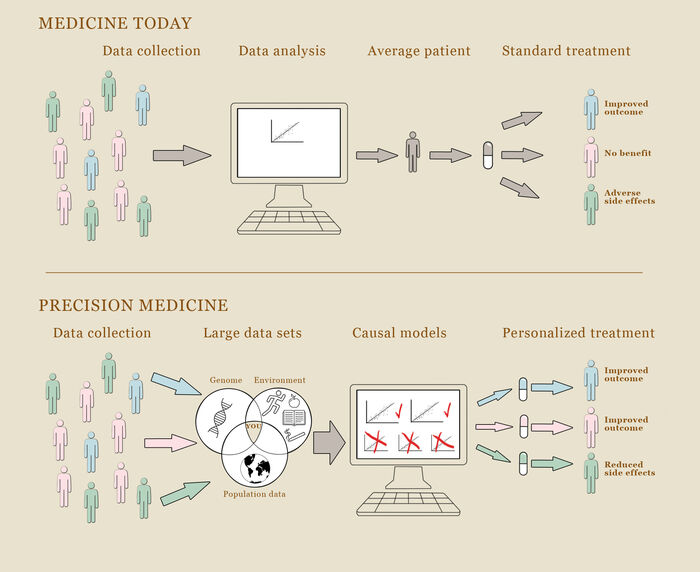Systems Immunology - Health in the Digital Age

Systems Immunology - Health in the Digital Age
Have you ever wondered why you get sick much more often than your colleagues or fellow students? You may soon know the answer. Researchers at the Department of Automatic Control, together with researchers at the Institute Pasteur in France, are currently transferring the knowledge obtained from large-scale data analysis into the field of immunology, paving way for a unique kind of precision medicine, and contributing to a whole new field of research – systems immunology.
Using data from 1 000 healthy French citizens (500 women and 500 men, aged 20 to 70 years), Jacob Bergstedt, a former PhD student at the Department of Automatic Control, and currently a postdoctoral fellow at the Institute Pasteur, has looked deep into the human genome, in an attempt to find out which factors influence our immune system most, and how these factors interact. Together with his colleagues at the Institute Pasteur, Etienne Patin, Lluis Quintana-Murci, and Matthew Albert, he has analyzed 166 different variables in the human immune system, more than 6 million genetic mutations, and a number of clinical and demographical parameters, such as age, gender, obesity, sleep patterns, education, and smoking. Handling such large data sets is not an easy task. “It requires not only more sophisticated analysis, but also much better software than previously used”, says Jacob Bergstedt. A fundamental issue associated with the analysis is that of statistical misconceptions. “When looking for causation in these huge data sets, one has to be very careful not to infer causal relations from statistical correlations”, says Bo Bernhardsson, professor at the Department of Automatic Control and Jacob Bergstedt’s main supervisor. To ensure that the French dataset was handled in an adequate manner, a so-called causal model was developed. “We combined old computation tools, some of them originally developed within machine learning and artificial intelligence, with new tools that we developed ourselves, in order to find ways to accurately analyze this rich and complex collection of data”, says Jacob Bergstedt.
Our environment affects us
So what were the most important results of their analyses? They found significant differences in the functioning of the immune system between men and women, and that environmental factors have a significantly greater impact on our immune system than previously realized. One example is smoking. It is well known that smoking constitutes a risk factor for infections. However, Jacob Bergstedt’s analyses showed that it has as great an impact on the immune system as age. “This is a completely new discovery”, he says.
One of the most apparent gender differences was that women produce significantly more T-cells than men during adult life. T-cells are one of the most important components of the immune system, and the increased production in women may explain why women generally have less risk of infection than men. Furthermore, Jacob Bergstedt and his colleagues found that the elevated levels of T-cells in women could be further amplified by one of the many mutations they studied. Apart from their higher production of T-cells, women also produce higher levels of so-called MAIT cells – a special type of T-cells – which have been connected to autoimmune diseases. The researchers speculated that this overproduction of MAIT cells in women may explain why middle-aged women are more afflicted by autoimmune diseases than men.
Apart from smoking, age, and gender, infection by cytomegalovirus (a common herpes virus) was among the most influential factors with regard to infection. “This is a relatively common virus, which seems to have a greater impact on our health than previously thought”, says Bo Bernhardsson.
The group now hopes that other medical institutes will make data available for analysis, to benefit more patients. “This type of refined analysis provides broader knowledge on individual prerequisites, which will ultimately help us develop more customized health care”, says Bo Bernhardsson.
Transparency the new praxis?
Increased transparency concerning the methodology used is as important as having access to new data. Being able to repeat other’s work, and arriving at the same conclusions, is the cornerstone of all research. Despite this, making data and code available is not common. “We would like to change this, and have therefore published our data and the code, so that anyone can use the data and run the analyses using the same software as us”, says Jacob Bergstedt. Jacob Bergstedt and Bo Bernhardsson hope that their transparency will set an example for other research groups. “I’m hoping that this will become praxis in the new field of systems immunology”, says Jacob Bergstedt.
Learn more:
The data and the code developed by the researchers are freely available here [länk: github.com/JacobBergstedt].
More information on this research can be found on the web pages of Jacob Bergstedt’s colleagues: Etienne Patin [länk: research.pasteur.fr/en/member/etienne-patin/], Lluis Quintana-Murci [länk: research.pasteur.fr/en/team/human-evolutionary-genetics/], and Matthew Albert [länk: research.pasteur.fr/en/member/matthew-albert/].
